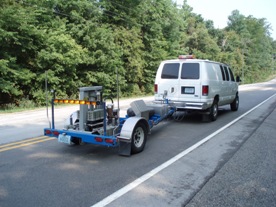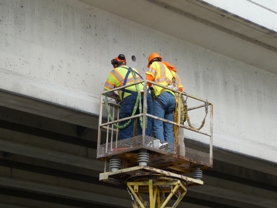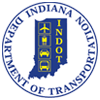A primary mission of the INDOT Research program is to conduct, oversee and partner in cost-effective transportation research, development and technology transfer that benefits our customers. Research & Development ultimately is responsible for the delivery of service in the following four business areas:
- Research, Development & Technology Transfer (RD&T)
- Specialized Testing
- Forensic Investigations
- Select Technical Training
To assist in fulfilling this responsibility, the INDOT Research Program reaches, in coordination with the Joint Transportation Research Program (JTRP), into Indiana's universities and associations, and Indiana industry and national affiliations for expertise and technical assistance in solving Indiana's transportation challenges.
Research, Development & Technology Transfer (RD&T)
INDOT Research and Development conducts research and oversees the JTRP initiative. Research projects are aligned with INDOT’s strategic plans and strategic goals including safety, cost savings, mobility/reduced congestion, economic competitiveness, asset sustainability, quality, and time savings and departmental Key Performance Indicators (KPIs). The research program utilizes direct contact with INDOT peer groups, focus groups, web links and the JTRP Executive Committee to identify and prioritize research needs. The Research Program promotes implementation of cost-effective research findings and reports on the return on the research investment (ROI) in an annual IMPACT and ROI reports. The program tracks performance and customer service metrics to evaluate program effectiveness and modify its business models. Periodic Peer Reviews of the program are also conducted. Marketing and communicating research results for statewide implementation is also a priority. Funding for the INDOT R&D program is from State Planning & Research (SPR) funding, which is a federal match program.
Other activities:
- Develops Annual Work Program and Cost Estimate,
- Provides data and analysis for data-driven decision making, evaluate warranties for the department’s pavement preservation and Skid Accident Reduction programs,
- Conducts research under the Federal Highway Administration National Experimental Features program on innovative products for use in Indiana,
- Collaborates with the Accelerated Pavement Testing Facility, North Central SuperPave Center, and Applied Concrete Research Initiative,
- Collaborates with the INDOT Innovation Office,
- Coordinates and networks, with national transportation research program (e.g. TRB, NCHRP, AASHTO, FHWA, USDOT, UTCs, etc.),
Specialized Testing
Specialized Testing provides services in a variety of areas related to pavements and structures for data driven decision-making and to minimize risks. These tests assist the department in warranty contract compliance, pavement designs, asset sustainability, roadway safety, life-cycle costs, etc. Specialized testing programs include:
- Pavement deflection testing to measure existing pavement condition and remaining life; provide analysis for pavement undersealing for structural support; overlay design; pavement investigations; prioritizing projects for rehabilitation and reconstruction at the project and program levels; etc.
- Pavement surface friction testing as part of the Skid Accident Reduction Program to identify potential slippery locations, the need for High Friction Surface Treatments, performance of Chip Seals, and identify materials/mixes that provide good skid resistance.
- Ride quality (smoothness) testing to ensure pavement smoothness, a primary variable in determining customer satisfaction and pavement life.
- Ground Penetrating Radar testing to examine subsurface conditions of pavement and bridges (e.g. corrosion surveys, voids, damaged pipe structures, etc.)
- Bridge non-destructive testing (NDT) to support bridge preservation and rehabilitation programs.
- 3-D laser testing for road condition surveying.

INDOT’s Specialized Testing Programs continue to grow and impact INDOT programs and decisions in contract scoping, resurfacing priorities, pavement preservation strategies, safety programs, etc. Specialized testing results not only provide quality data for data driven decision-making, but minimizes risk, reduces life cycle costs, and helps to provide safe roads for the travelling public. A recent consultant review indicated data from specialized testing conservatively impacts $66.9 million of decisions annually.
Forensic Investigation

Technical Training & Support
Technical training and support is provided in the areas of pavement design, proper construction/inspection techniques, applied statistics, and asset management. Additionally, this program assists in developing and providing training with various organizations, including the American Society of Civil Engineers (ASCE), American Concrete Pavement Association (ACPA), National Asphalt Pavement Association (NAPA), Transportation Research Board (TRB), and the National Highway Institute (NHI).
On January 1, 2009, INDOT formally adopted the new pavement design known as the Mechanistic-Empirical Pavement Design Guide (MEPDG). Research & Development provides input parameters for the design and provides training to INDOT pavement design engineers. Additionally, R&D provides tech support for the pavement design software. Due to this initiative, an estimated $10 million in material costs alone were realized through site specific pavement designs.
Partnerships
The INDOT Research Program, in conjunction with its partners, is active on the national, state, and local levels identifying and addressing Indiana’s transportation needs, as well as working together to attract external, competitive research funding, available at the national level, for use in addressing Indiana needs. Indiana universities provide an extension of INDOT capabilities by allowing some of the ‘best minds’ in the State to address Indiana’s transportation needs. Through partnering with Indiana industry and other State DOTs, resources can be leveraged and expertise can be combined to address problems of mutual interest. By including Indiana industry in the research process, problems related to implementing viable research results can be identified and addressed early, thereby allowing for a smoother transition and implementation of research findings into operations. The INDOT Research Program collaborates with the INDOT Innovation Office in identifying and adopting new technologies and innovations for quicker implementation into INDOT business processes.
Contact Information
Barry K. Partridge, Ph.D, P.E.
Director-Research & Development
1205 Montgomery Street
P.O.Box 2279
West Lafayette, IN 47906
P: 765-463-1251 x 251
bpartridge@indot.in.gov
Related Links
INDOT Innovative Programs
Innovation and Research Needs & Ideas
Research Program IMPACT Report
INDOT Research Program Return on Investment
Submission of Research Ideas to INDOT
